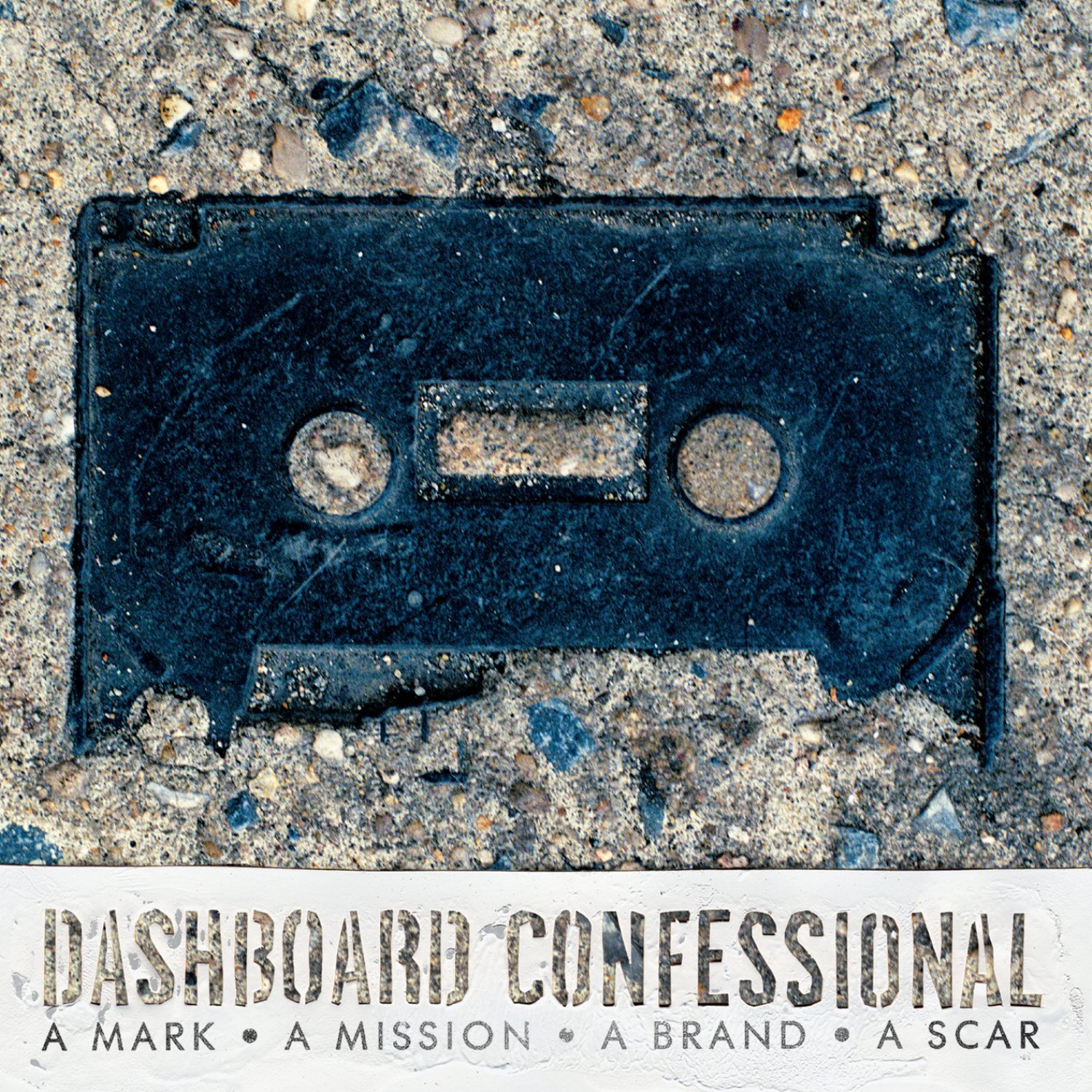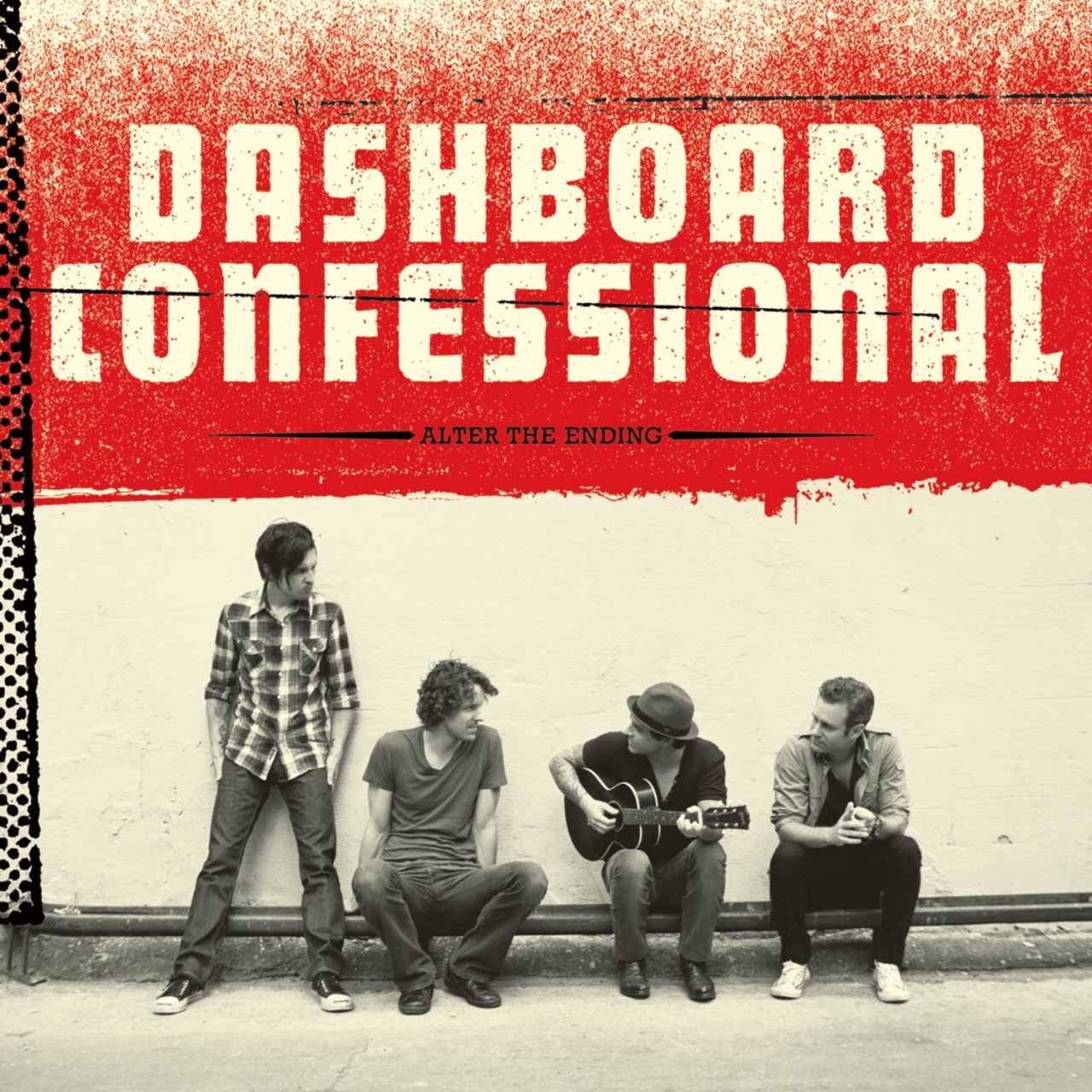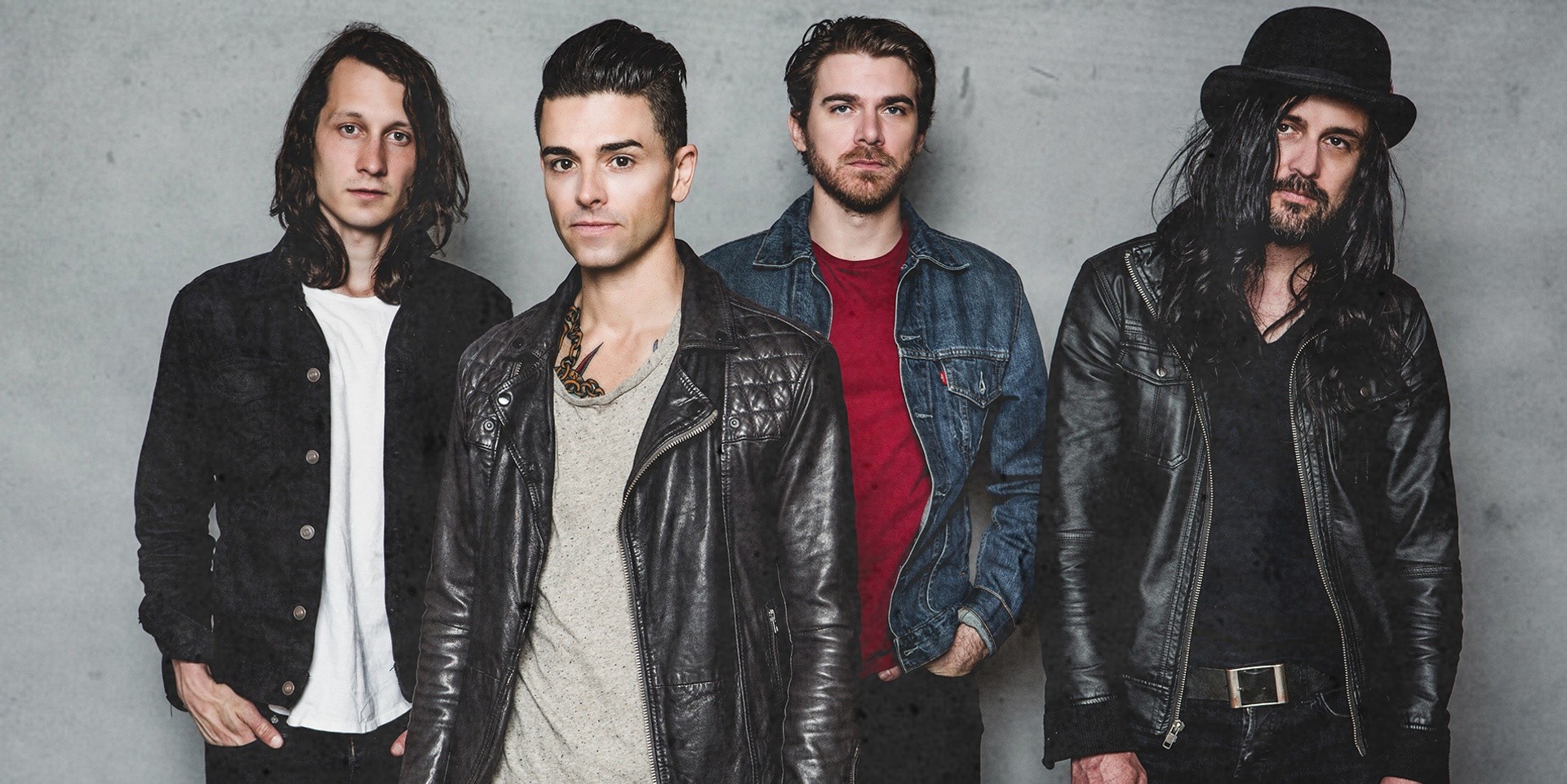Bandwagon recently caught up with Chris Carrabba from Dashboard Confessional and we got him to run through the band's discography with us before the band's highly anticipated gig next weekend.
What transpired, instead, was a detailed overview by Carrabba over the band's 18-year existence so far, from their first album to their recent hiatus. He had a lot to say, so if you're a die-hard fan, strap yourself in — it's a good one.

The Swiss Army Romance (2000)
When working on a debut album, everyone always tries to put out the best music they can — I assume it was no different for you. How did you decide which songs were good enough for the album, and which had to be cut?
Nothing was cut from that record. I didn't expect anyone to actually hear that record. I had no reason to expect that people would. When I had enough songs to make a record, I just went and recorded it in my friend’s apartment/closet."
How long did the first album take to record?
Two nights."
What’s your fondest memory from making the album?
I think something that I remember very fondly from that era was: my friend James, who produced the record, had asked me if he could hear the songs first. And so, I immediately recorded them with an old tape recorder that I had and I brought it to his work and dropped it off.
I picked a random order to record the songs and that’s the order they appear in on the record. I always thought there was something to that, there's something special about the fact that I never really thought too much more about it."
Was performing live at this point intimidating?
Yes. Yes, it’s intimidating now (laughs). It was extremely intimidating, I would even go so far as to boldly say that it was terrifying for me."

The Places You Have Come To Fear The Most (2001)
Your debut album had just been released four months prior — why the quick turnaround?
I had released Swiss Army Romance on my friend’s label and the label sold the rights of the record to another label that had wanted to sign us. As I began to negotiate with that label, I began to realize that the label wasn't going to be a good home for me, and I told them so.
They told me they were shelving the record, which means pulling it out of the stores and I had to decide what to do about that. I thought, either I could deal with the possibility that my career was over or I could sign with the label I intended to. I just got busy recording a new record.
So the next day after they told me they were pulling the record, that’s what I did. I signed with Vagrant Records and I flew back to Florida and I met my brother, Matthew, at the airport with my guitar and I went straight to the James’ apartment and recorded a new batch of songs.
For some reason I thought it would be a good idea to keep these songs ready and I knew that I had the rights to re-record them. I just didn't want them to fall away into someone else’s fit of anger over me not signing with them."
Following up from your debut, what kind of pressure did you face going into the studio?
There still was no pressure. At this point, Dashboard had starting growing a name out of the live gigs, there were no reviews of the records or anything about the band, really.
We found great success with a small audience — the songs were important to these people but we weren't savvy enough to know to do the album any differently from how I did it the first time. So I didn't really think about pressure."

A Mark, A Mission, A Brand, A Scar (2003)
The album debuted at number 2 on the billboard 200 chart, which is insane. What ran through your mind when you first heard the news?
“This is insane.” That’s the exact phrase that ran through my mind — especially because this was not a major label release. We were an indie band in the process of signing to a major label — I’m not too sure right now, it’s all a little hazy.
But in any event, we had no expectation of ever charting at number 2, let alone being on the charts."
What was your favorite moment from that period?
During that touring cycle, we were asked to tour with bands we had grown up listening to, and who had big influences on us, such as Weezer and Beck.
Just being able to spend time with those bands, being on the same stage as them, listening to their advice for us, watching the way they carried themselves — it made quite an impression on me. The memories of those shows stay with me."
Dusk And Summer (2006)
Coming off the success of A Mark…, how did it feel like going back into the studio?
I think this was the first time I began to feel the pressure from the label. I began to have my vision influenced to become something and resulted in something that was not quite the way I intended. I wasn't necessarily put off by this, I was up for the challenge.
I would say, the records we’ve talked about so far — the first three, along with the first half of Dusk and Summer — feel like one era of the band. Everything from thereon feels like another era. Up until now, we just finished a new record and it feels like where I wanted to be with Dusk And Summer.
This was your fourth album in six years. At any point, did it all get too overwhelming?
Probably, yes. I don't think I handled myself well a couple of times — there are a few regrets I have. The way that you guide a band through its career, you can only do that in the now. You can only make decisions with the information you've learnt so far. Suddenly, we were on a much grander stage, for lack of a better word.
I had no experience at that level but was expected to know how to navigate through it. I think I could’ve made some better decisions. I think I made a lot of great decisions for the band but I feel like I could’ve made some better ones."
At that point, ‘Vindicated’ was a huge success and was added to this album. Were there droves of casual fans coming to your shows just for that song? If so, was there any urge to prank them or play around with their expectations?
I don’t think that happened in quite the way that it might be perceived. 'Vindicated' became this successful song, that is true. But it still clung onto this unusual way, it never had the usual way of gaining popularity through the radio like my friends' bands had. We never got radio play. We’ve never had a hit on radio.
While 'Vindicated' was something that was a big moment for us, it certainly moved the cultural needle for a lot of music fans. I think it attracted a lot of fans that already liked our scene but had never listened to our music yet. Everyone thought 'Vindicated' was the best indication of what Dashboard is all about.
We really thought we were going to get on the radio, we thought for sure we were going to have a hit but it didn't happen. But it became apparent around that time that we weren't a band that was going to have hits, we were the kind of band that was going to have a huge touring audience."

The Shade of Poison Trees (2007)
It has been said that the album was recorded over 10 days. How did you put this together?
Yeah, it was recorded over 10 days — it was also written and recorded in a total of 12 days. I had two or three songs that were written earlier, and the rest were within the 12 days.
The recording process in the earlier part of our career — like we’ve talked about — remained and still remain a very important way to make music to me. The whole thing is kind of a mystery and it is pretty spontaneous because of the eagerness to write new music.
I feel like if we didn't do that after a very long cycle of touring for the previous record, then we might not ever have had the chance to do it again."
During the album cycle, you co-headlined a tour with Panic! At The Disco. Tell us what that was like.
It was great. I think their original line-up broke up shortly after that tour. I would wonder if my friends in Panic! would think the same way I do, that it was a great tour.
I didn't think they were having as much fun as we were and then I knew why shortly thereafter. But look at them now, it’s amazing how their career has been reinvented because they decided not to give up."

Alter The Ending (2009)
This album was different in the sense that it had two versions — the full-band version and the acoustic version. Why is that?
I don't know if that’s the only reason it's weird. A part of why I think that album was weird was because the label that we were on had a turnover of staff so the same people that we signed with were no longer there. We didn't feel at home with the label anymore.
The reason I decided we should make the acoustic version was because when we finished making the record — which frankly was a very long, long process — I looked at the band and asked “do you feel connected to the songs?” and we sort of didn't. We recognized that they were good songs but we couldn't figure out why we weren't connected to it, because we had written them ourselves.
We decided to go into a room and play them acoustically and just kept playing them over and over. Then Johnny, our former guitar player said “Chris, let's put some mics up." I asked, "What for?" and he said “What if we forget this? We’re finding the album again, what if we forget this moment?”
So what you hear on the acoustic record — with the exception of a few vocal tracks — I had to use the album version because maybe I didn't sing through it enough times to get a take of it or something, it was largely just us trying to find the record for ourselves. I really think that’s a unique thing in itself. I don't know that I’ll ever have that happen again."
'Belle Of The Boulevard' was the lead single off the album. What factored into that choice?
I’ve never known the answer to that question. It turns out I just write records, the record label decides which singles to push out. I respect that it’s someone else’s job and, though I might object or concur to certain decisions, it is still someone else's job and I’m comfortable with that.
I have my opinions, don't get me wrong, especially this time around I have stronger opinions than ever before, but at that point I thought, “they like 'Belle', so okay." The funny thing about that is there was this strange push at that time for all these existing bands that had written numerous records to begin to co-write with people.
I was pressed to co-write with people, and I did, and a lot of the songs for other people have been more successful than I’ve ever had. But during that time, I basically told the label just to get them off my back that 'Belle Of The Boulevard' was a co-write, but it wasn't. I just told them that so they would forcing me to go to somebody.
And I said “look what I did with —“ and I just made up a name. Paul Jones or something I said his name was. “Look what I did with Paul Jones” and they said “Wow, this Paul Jones is great! This is a fantastic song, this should be the lead single.” So I agreed and said that I thought he’d be happy to know that. The man doesn't exist. (laughs)"
HIATUS (2011-2015)
You went on a hiatus for a little bit. Can you tell us what you did during that time and what you’ve learnt from that time?
"I lived. My writing is based on my life’s experience and I had run into this situation where I was just writing a record, releasing a record, touring a record and repeating the whole cycle.
I saw no end in sight of that but I thought “this might ruin my career but if I don’t walk away, it will definitely end my career.” Because I would no longer have anything to say as a writer."
PRESENT DAY
You stated earlier that you just got done wrapping up a new album. Can you give us an insight into the album?
I can tell you a few things. I can tell you that, to me, if there was a fork in the road that occurred halfway through writing Dusk and Summer, where I went down a path that was personally less rewarding, this is the landscape I would've discovered had I taken the other road."
Would you say this album is 100% something you wanted to write without any label executives stepping in?
I think it was helpful to have those executives, I learned a lot. But I learnt more without them for this record (laughs)"
Is there anything in your career you’d like to change?
I very much appreciate my career. There are things we wish we could’ve done sooner but, at some point, in the last few years, Scott — our bass player— and I, have decided to make a daily routine of stopping wherever we are, whatever city or country we’re in, and going somewhere, maybe have a coffee and just take a moment to stop and appreciate the fact that we get to be in a band and travel the world.
We were so busy for so long, we had run so ragged as a touring band that I would leave whatever club we were playing in and just go see the city and appreciate it. I wish I had done that sooner. But I’ll tell you one thing, I’m so excited to come to Singapore. More than the city, I can't wait to see the fans.
I expect to be knocked out by the audience. I’ve been so excited for this show. We’re on our social media all the time and we see comments from Singapore and we’re so eager to get back."
Dashboard Confessional are set to return to Singapore on September 9th, but this show will mark their first time performing here as a full live band. Get your tickets for the show here.
Special thanks to LAMC Productions for setting up the interview.
Like what you read? Show our writer some love!
-

